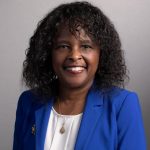When former ACR President Joseph Flood, MD, tapped Deborah Dyett Desir, MD, to volunteer for an ACR committee, he might have assumed that her preference would be to serve on the Committee on Rheumatologic Care or its Insurance Subcommittee. After all, Dr. Desir is in private practice at the Arthritis and Osteoporosis Center PC in Hamden, Conn., which she founded in 1993, and those committees could have been a good fit for her. She also serves as a clinical assistant professor of medicine at Yale, is president elect of the New Haven County Medical Association and is a member of the Finance Committee for the Connecticut State Medical Society.
Dr. Desir’s preference, however, was to become a member of the ACR’s Government Affairs Committee (GAC). She had already participated in the ACR-sponsored Advocates for Arthritis on Capitol Hill and had lobbied the Connecticut Congressional delegation about patient care issues. She was eager to do more.
“I think, as citizens in a representative democracy, we have to be active,” she says.
Skin in the Game
Dr. Desir has been interested, and active, in politics since childhood and says that recruiting for causes and candidates comes easy to her. To colleagues who have yet to engage in the political arena, Dr. Desir says, “It should be clearer and clearer, with pages of regulations and laws pertaining to healthcare, that we are already very much involved [in politics]. What’s happening politically affects our ability to take care of our patients.”
She encourages the physicians in her practice to donate to RheumPAC and thinks every member of the ACR should consider investing. She acknowledges that some may be concerned that RheumPAC is nonpartisan. She is herself a staunch Democrat, but supports RheumPAC because it “deals with issues, not candidates, and is very specifically talking about rheumatology patient issues.”
Where to Start?
In addition to urging rheumatologists to contribute to RheumPAC, Dr. Desir says members should start by contacting the local offices of their Congressional representatives. Physicians needn’t feel reticent to contact their local representatives to lobby for patient care issues, she says. In Dr. Desir’s experience, “Even if you are taking up a point with which [the representative doesn’t] necessarily agree, they will listen respectfully and give a thoughtful answer. Representatives want to hear from constituents, and their local staffs are happy to talk to you,” she says.


